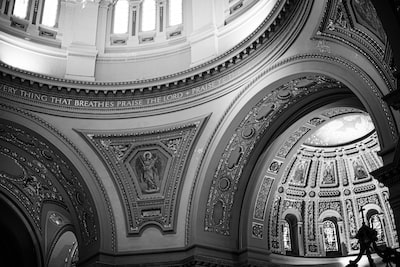Introduction: Exodus 31 Revealing Jesus’ Messianic Prophetic Connections
The significance of Exodus 31 in revealing Jesus’ messianic prophetic connections is a topic of great interest for those seeking a deeper understanding of the Old Testament and its connection to Jesus as the Messiah. Through an exploration of messianic prophecies and biblical context, we can uncover specific connections between Exodus 31 and Jesus. Understanding these connections is essential in recognizing Jesus’ role as the fulfillment of biblical prophecy and deepening our faith in Him as the Messiah.
In Exodus 31, we see the Lord commanding the craftsmen working on the tabernacle to observe the Sabbath and cease their work. This command not only emphasizes the importance of rest and the sanctity of the Sabbath but also foreshadows Jesus’ role as the ultimate craftsman. Just as the skilled craftsmen were involved in constructing the tabernacle, Jesus skillfully constructs our lives, transforming us into vessels of His grace and love. He is the one who can shape us into His image, molding us into vessels that bring glory to Him.
Moreover, this connection between Exodus 31 and Jesus goes beyond His role as a craftsman. It also highlights the significance of the tabernacle itself. The tabernacle was a place where God’s presence dwelled among His people. Similarly, Jesus, as the Son of God, came to dwell among us (John 1:14). The sacrifices offered in the tabernacle prefigured Jesus’ ultimate sacrifice on the cross, where He gave His life to bring salvation to humanity. By recognizing these connections, we gain a deeper appreciation for Jesus’ role as the Messiah and the significance of His sacrifice.
The connections between Exodus 31 and Jesus reveal His role as the ultimate craftsman, the bringer of spiritual rest and salvation, and the fulfillment of the tabernacle and its sacrificial system. By understanding Jesus’ messianic nature and significance, we are led to a deeper appreciation of His redemptive work and are called to surrender our lives to Him. May we continue to seek a deeper understanding of Jesus’ messianic role in the Old Testament and grow in our relationship with Him.
Overview of Exodus 31
Exodus 31 is a pivotal chapter in the book of Exodus, which focuses on the construction of the tabernacle and the role of the craftsmen. The tabernacle was a portable sanctuary that served as a place of worship for the Israelites during their time in the wilderness. The Lord chose skilled craftsmen, Bezalel and Oholiab, to oversee the construction of the tabernacle and its various elements.
In this chapter, the Lord reminds the craftsmen to observe the Sabbath and cease their work. This command highlights the importance of rest and the sanctity of the Sabbath in the life of a believer. Keeping the Sabbath is not only a sign of the covenant between God and Israel but also a demonstration that they are His chosen people. By observing the Sabbath, the Israelites were set apart from the nations around them and demonstrated their obedience and trust in God.
The construction of the tabernacle and the observance of the Sabbath were not merely religious rituals; they had profound spiritual significance. The tabernacle was a tangible representation of God’s presence among His people, and the Sabbath was a time set aside for rest, worship, and reflection on God’s goodness. These practices were designed to deepen the Israelites’ relationship with God and remind them of His faithfulness and provision.
The construction of the tabernacle required skilled craftsmen who were gifted by the Lord. Bezalel and Oholiab were chosen specifically by God and filled with His Spirit, giving them the wisdom, understanding, and knowledge necessary to complete the intricate work (Exodus 31:2-6). This divine empowerment highlights the importance of God’s involvement in the construction of the tabernacle, emphasizing His desire to dwell among His people.
Messianic Prophecies in the Old Testament
Messianic prophecies play a crucial role in foreshadowing the coming of Jesus as the Messiah. These prophecies can be found throughout the Old Testament, particularly in books like Isaiah, Psalms, and Micah. They provide glimpses of the future Messiah’s birth, ministry, death, and resurrection, giving us a framework for understanding the connections between Exodus 31 and Jesus.
Isaiah, in particular, contains numerous messianic prophecies. Isaiah 7:14 prophesies the virgin birth of Jesus, where it says, “Therefore the Lord himself will give you a sign: The virgin will conceive and give birth to a son, and will call him Immanuel.” This prophecy is fulfilled in the New Testament when Jesus is born to the virgin Mary (Matthew 1:22-23). Another significant prophecy can be found in Isaiah 9:6-7, which speaks of the Messiah’s birth and His eternal reign. It says, “For to us a child is born, to us a son is given, and the government will be on his shoulders. And he will be called Wonderful Counselor, Mighty God, Everlasting Father, Prince of Peace.” This prophecy foreshadows Jesus’ birth and His role as the Messiah, who brings peace and reigns eternally.
In addition to Isaiah, other books in the Old Testament also contain messianic prophecies. For example, Micah 5:2 prophesies that the Messiah will be born in Bethlehem, which is precisely where Jesus was born (Matthew 2:1-6). The prophecy in Micah highlights the specific details of Jesus’ birthplace, further confirming His identity as the fulfillment of biblical prophecy. Furthermore, Psalm 22 describes the suffering and crucifixion of the Messiah, which Jesus fulfilled on the cross. This psalm provides a prophetic glimpse into the anguish and redemption that Jesus would bring through His sacrifice.
These messianic prophecies, along with many others, confirm Jesus’ identity as the fulfillment of biblical prophecy and the long-awaited Messiah. They provide a framework for understanding the connections between Exodus 31 and Jesus, further strengthening our faith in Him as the Savior and Redeemer.
Connections between Exodus 31 and Jesus
There are several significant connections between Exodus 31 and Jesus that reveal His messianic nature. One such connection is Jesus as the ultimate craftsman. Just as the skilled craftsmen were involved in constructing the tabernacle in Exodus 31, Jesus fulfills the role of the craftsman in a spiritual sense. He is the one who skillfully constructs our lives, transforming us into vessels of His grace and love. Through His work in our lives, He shapes us into instruments of His righteousness, using us for His divine purposes.
Another connection can be seen in the symbolic significance of the Sabbath rest in Exodus 31. The Sabbath was a day of complete rest, and anyone who worked on it would face dire consequences. This Sabbath rest points to Jesus’ role in bringing spiritual rest and salvation. In Matthew 11:28-30, Jesus invites us to find rest in Him, promising to give rest to our souls. He says, “Come to me, all you who are weary and burdened, and I will give you rest. Take my yoke upon you and learn from me, for I am gentle and humble in heart, and you will find rest for your souls. For my yoke is easy and my burden is light.” In Hebrews 4:9-11, it is emphasized that there remains a Sabbath rest for the people of God, referring to the spiritual rest that Jesus provides. Through His death and resurrection, Jesus offers us the opportunity to enter into His rest and experience the peace and restoration that only He can provide.
Additionally, the tabernacle and its various elements in Exodus 31 prefigure Jesus’ ministry and sacrifice. The tabernacle was a place where God’s presence dwelled among His people, and Jesus, as the Son of God, came to dwell among us (John 1:14). The sacrifices offered in the tabernacle foreshadowed Jesus’ ultimate sacrifice on the cross, where He gave His life to bring salvation to humanity. In the New Testament, Jesus is referred to as the Lamb of God who takes away the sin of the world (John 1:29). His sacrifice on the cross is the ultimate fulfillment of the sacrificial system established in the tabernacle. Jesus’ death and resurrection provide the way for humanity to be reconciled with God and receive forgiveness for sins.
Recognizing these connections between Exodus 31 and Jesus deepens our understanding of biblical prophecy and strengthens our faith in Him as the Messiah. It reminds us that Jesus is not just a historical figure but the fulfillment of God’s promises and the culmination of God’s redemptive plan for humanity.
Significance of Jesus as the Messiah
Understanding Jesus’ role as the Messiah is of utmost importance in Christian theology. Jesus’ fulfillment of messianic prophecies establishes His authority and divinity. Through His birth, ministry, death, and resurrection, Jesus fulfills the promises of the Old Testament and brings redemption to humanity. He is the long-awaited Savior who came to reconcile us to God and offer salvation to all who believe in Him.
Recognizing Jesus as the Messiah has transformative power in our faith journey. It goes beyond mere intellectual knowledge and calls for a personal response. When we acknowledge Jesus as the Messiah, we surrender our lives to Him and experience His saving grace. We are forgiven of our sins, adopted into God’s family, and given the gift of eternal life. Our relationship with God is restored, and we are empowered to live a life that reflects His love and truth.
The significance of Jesus as the Messiah extends beyond our individual faith. It has implications for the world as a whole. Jesus’ redemptive work on the cross has the power to transform societies, bring justice, and reconcile people from all nations and backgrounds. As followers of Jesus, we are called to be ambassadors of His kingdom, proclaiming the good news of salvation and working towards the restoration of all things.
In conclusion, recognizing Jesus’ messianic connections in Exodus 31 deepens our understanding of biblical prophecy and strengthens our faith in Him as the Savior and Redeemer. The connections between Exodus 31 and Jesus reveal His role as the ultimate craftsman, the bringer of spiritual rest and salvation, and the fulfillment of the tabernacle and its sacrificial system. By understanding Jesus’ messianic nature and significance, we are led to a deeper appreciation of His redemptive work and are called to surrender our lives to Him. May we continue to seek a deeper understanding of Jesus’ messianic role in the Old Testament and grow in our relationship with Him.


